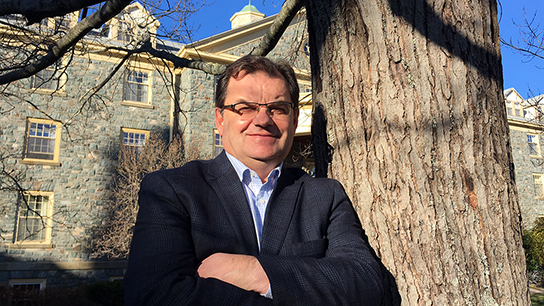Environment
University of King’s College president chooses advisers for upcoming forestry review
William Lahey asked by province to submit a report by the end of February

caption

caption
President of the University of King’s College, William Lahey, is leading a review of forestry practices in Nova Scotia.When it comes to protecting and managing Nova Scotia’s forests, it takes a village — or at least a well-chosen team of experts.
William Lahey, president of the University of King’s College, has selected a team of advisers to assist him with the Independent Review of Forest Practices in Nova Scotia.
Lahey was appointed project leader for the review in August. It’s a followup to the Natural Resources Strategy developed by the Department of Natural Resources in 2011, which called for changes to Nova Scotia’s forest management.
Lahey and his team announced in a press release on Thursday they will evaluate the strengths and weaknesses of forest practices.
“In general, I was looking for people with areas of expertise … (and) with experience that gave them a broader knowledge but were largely from outside the province so that they could bring a fresh perspective,” said Lahey.
The advisers are Al Gorley of British Columbia’s Independent Forest Practices Board, Laird Van Damme from Lakehead University, Jeremy Williams and Christopher Wedeles of Arborvitae Environmental Services Ltd., and Malcolm Hunter and Robert Seymour, professors at the University of Maine. From Nova Scotia Lahey chose Peter Duinker, a professor at Dalhousie’s School for Resource and Environmental Studies.
Lahey will also consult with the Forest Biodiversity Science Advisory Committee at the Department of Natural Resources.
According to a news release from Aug. 30, Lahey will provide a report reviewing forestry practices, including an in-depth look at the wood supply on Crown land in Nova Scotia.
Lahey said Nova Scotia is 35 per cent Crown land, which is a much lower percentage than other provinces in the country.
“In all other Canadian provinces that do a lot of forestry, a lot of the forestry happens on Crown land,” he said. “That means that a lot of forestry in Nova Scotia happens on private land that is not subject to direct control by government.”
For this reason meetings will be held with stakeholders who own land in the province. Lahey said one preliminary round of meetings has been completed. Other meetings will be scheduled at some point and additional independent research will be conducted.
“That’s how we’re going to get to conclusions,” he said, adding that sustaining a healthy environment will be a key focus.
“I’m very interested in seeing if I can help the environment, and (the) forestry’s a critically important industry relative to biodiversity and the health of the environment,” he said.
One of the advisers, Duinker, expects the team will find common ground, but said there may be challenges with the stakeholders agreeing with one another.
“If you’re talking about matters of the highest stratum of forest policy or the most particular decisions about what to do in a particular stand of trees, people disagree with each other,” he said.
Raymond Plourde, wilderness co-ordinator for the Ecology Action Centre, will be involved with the review by representing his organization as a stakeholder.
Plourde said the EAC has been campaigning for close to 20 years for a reform of industrial forestry practices to better suit Nova Scotia’s native Acadian forests.
“Our forests are in steep decline; the age classes have decreased,” he said.
Plourde said he is confident in Lahey’s ability to conduct the review, but has concerns that the government is putting it under a “ridiculously short time-frame” of only a few months.
“He’s been given a kind of impossible task, in my view,” Plourde said. “We have faith in him, and hope that the team he’s assembled around him are able to give him what he needs to make good solid recommendations that point us towards truly sustainable forestry practices.”
Lahey is expected to submit a final report at the end of February to Natural Resources Minister Margaret Miller.

